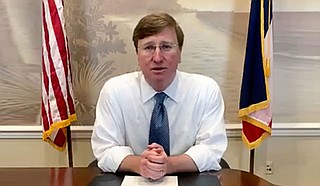Thursday, March 19, 2020
Mississippi public schools will be closed until at least April 17 to curb the spread of the new coronavirus, Gov. Tate Reeves said Thursday. Photo courtesy State of Mississippi
JACKSON, Miss. (AP) — Mississippi public schools will be closed until at least April 17 to curb the spread of the new coronavirus, Gov. Tate Reeves said Thursday.
He said schools will continue to receive state money and teachers will continue to be paid. He said he wants students to continue learning.
“This is not a time to take a vacation,” Reeves said in a Facebook live presentation from the Governor's Mansion.
Reeves said he will also relax end-of-year testing requirements and school accountability measures. He said the state Board of Education will have “maximum flexibility” to waive rules.
Mississippi reported 50 confirmed cases of the virus as of Thursday, up from 34 Wednesday. The state Health Department said 602 people had been tested in Mississippi by Thursday.
The vast majority of people infected with this novel coronavirus get only mild or moderate symptoms, such as fever and cough, and recover in about two weeks. But many will need hospitalization — particularly vulnerable are older adults and those with existing health problems who can develop severe complications, including pneumonia.
Some communities in Mississippi are temporarily shutting down bars and telling restaurants to close their dining rooms to try to slow the spread of the virus.
Jackson Mayor Chokwe Antar Lumumba issued an order prohibiting gatherings of 10 or more people.
"The city of Jackson does not have the luxury of a wait-and-see approach to the coronavirus pandemic," the order says.
The University of Mississippi Medical Center in Jackson working to develop its own coronavirus test amid high demand for test kits nationwide, and it is increasing its telehealth capacity to screen patients remotely.
The medical center's head of emergency medicine, Dr. Alan Jones, said it's “very important” that people not go to an emergency room if they think they have symptoms. Instead, they should first use a telephone or telehealth service to get advice on what to do.
“We are ramping up all of our contingency planning to prepare for a tidal wave of patients that we know is about to hit us," Jones said Wednesday.
